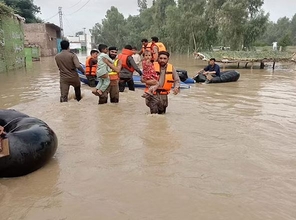According to a statement released by the United Nations Children’s Fund (UNICEF) on Wednesday, more than three million children in Pakistan are in danger as a direct result of the devastation caused by the floods.
According to the statement in the release, “more than three million children are in need of humanitarian assistance and are at greater risk of waterborne infections, drowning, and starvation owing to the most catastrophic floods in Pakistan’s recent history.”
The intense monsoon rains started around the middle of July 2022, and since then, they have had a devastating effect over the nation, impacting 33 million people in 116 districts, with 66 districts being the most severely affected.
According to the statement, “UNICEF is working with government and non-government partners to respond to the immediate needs of children and families in impacted regions.”
A state of emergency was proclaimed in Pakistan one week ago, and the country has since made a request for aid from other nations and international organisations in light of the devastating floods.
In the statement, UNICEF said that the high monsoon rains in Pakistan this year have impacted 33 million people, including nearly 16 million children. These monsoon rains have produced disastrous storms, floods, and landslides throughout the country.
More than 287,000 homes have been wiped down entirely, and another 662,000 are damaged beyond repair. The banks of many major rivers have been broken, and dams have spilled, which has resulted in the destruction of houses, farms, and vital infrastructure like as roads, bridges, schools, hospitals, and other public health services “according to the statement.
In addition, according to UNICEF, it is projected that thirty percent of the water systems in the regions that were touched by the floods have been destroyed, and there have already been reports of instances of diarrhoea and other water-borne illnesses, as well as respiratory infections and skin problems.
Forty percent of children already suffered from stunting, which is caused by chronic undernutrition, before the floods came.” It is anticipated that the already precarious humanitarian situation will continue to deteriorate over the next few days and weeks as heavy rains continue in areas that are currently under water.
In light of the fact that it is anticipated that the flooding will continue to get worse over the next few days, which will have an even greater impact on humanitarian efforts and public health, the World Health Organization’s (WHO) immediate priorities are to rapidly expand access to essential health services for the population that has been affected by the flooding, to strengthen and expand disease surveillance, outbreak prevention and control, and to ensure a well-coordinated response at national and subnational levels, including the participation of all relevant partners.
According to the World Health Organization (WHO), the Government of Pakistan is leading the national response, which includes declaring a state of emergency in affected areas, establishing control rooms and medical camps at the provincial and district level, organising air evacuation operations, and conducting health awareness sessions for people who are now at an increased risk of contracting waterborne and vector-borne diseases, as well as other infectious diseases such as COVID-19.

